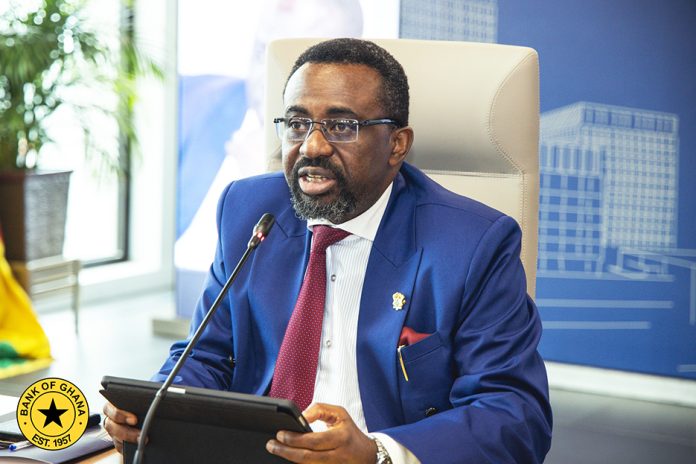Ghana’s total public debt has dropped significantly, recording an 18% decline in just six months from 61.8% of Gross Domestic Product (GDP) at the end of December 2024 to 43.8% as of June 2025.
The reduction was announced by the Governor of the Bank of Ghana, Dr Johnson P. Asiama, at the press briefing of the 125th Monetary Policy Committee (MPC) meeting.
According to the Governor, the reduction is attributed to the appreciation of the cedi, reduced domestic borrowing and progress made in external debt restructuring.
The development is expected to strengthen investor confidence, ease inflationary pressures and create more fiscal space for social and capital investment.
“We’ve seen a considerable turnaround in Ghana’s economic fundamentals. The drop in debt levels reflects a coordinated effort across monetary and fiscal policy, supported by prudent expenditure management and a narrowing fiscal deficit,” Governor Asiama stated.
The fiscal deficit stood at 0.7% of GDP in the first half of 2025, well below the budgeted 1.8%. The strong fiscal outturn was largely financed from domestic sources, reducing reliance on foreign debt and minimizing exposure to exchange rate risks.
Ghana’s economic recovery also received a boost from improvements in the real sector. The Bank’s Composite Index of Economic Activity (CIEA) recorded a 4.4% year-on-year growth in May 2025, up from 3.4% in the same period in 2024.
Increased international trade, consumer spending, construction activity, and tourism drove the momentum.
On the inflation front, there’s continued progress. Headline inflation fell to 13.7% in June 2025, down from 18.4% in May. This marks the lowest rate since December 2021.
The Central Bank credits this disinflation to tight monetary policy, easing food supply challenges, fiscal consolidation and the cedi’s appreciation.
Core inflation, which excludes volatile energy and utility prices also declined markedly, further anchoring inflation expectations among consumers, businesses and financial institutions.
These improvements prompted the MPC to cut the monetary policy rate by 300 basis points, bringing it to 25%.
The easing of short-term interest rates has led to lower government borrowing costs, which supports ongoing efforts to consolidate fiscal policy.
The Central Bank emphasised that it would continue to assess economic data and could reduce rates further if the disinflation trend holds.
On the external front, Ghana posted a balance of payments surplus of $2.2 billion as of June 2025, a significant jump from $588.5 million in June 2024.
Gross international reserves also rose to $11.1 billion, equivalent to 4.8 months of import cover, up from $8.9 billion or 4 months at the end of December 2024.
The Central Bank noted that the external sector remains robust, bolstered by favourable commodity prices, rising production volumes and improved remittance inflows.
These developments have supported a stronger cedi, which appreciated by 40.7% against the US dollar in the year to July 25, 2025.
Meanwhile, the banking sector remained stable, with improvements in liquidity, profitability, and asset growth. The non-performing loan (NPL) ratio declined due to improved credit risk management and recapitalization efforts.
The Governor stressed that the country is on a solid recovery path, supported by improved macroeconomic indicators, stable inflation expectations, a strong external position, and renewed confidence in monetary and fiscal governance.
Answering questions on issues from dollar shortages in banks and exchange rate management to banking sector performance and remittance monitoring, the Governor explained that while some banks have experienced short-term challenges meeting high demand for foreign currency, the central bank continues to support the market with daily interventions.
He attributed some delays to documentation issues on the part of importers and emphasised that the Bank is actively monitoring inflows, especially from the mining sector and remittances.
The Governor also addressed speculation about pressure to restore licenses of collapsed banks. He stated clearly that no such pressure exists, adding that the resolution process is ongoing and subject to legal proceedings and regulatory guidelines.
Concerning Non-Performing Loans (NPLs), he acknowledged the elevated NPL ratio of 23.1% and noted that the Bank of Ghana has issued fresh directives to commercial banks aimed at improving credit risk management.
He stressed the need for banks to strengthen credit administration, especially as the economy moves into a lower interest rate environment where lending will become the main revenue source for banks.
Responding to questions on remittance flows, the Governor disclosed that there has been a noticeable drop since April 2025, prompting the Bank to intensify monitoring of Payment Service Providers (PSPs), Money Transfer Operators (MTOs) and banks to ensure foreign currency inflows are properly reported and routed into the formal system.
On exchange rate concerns, Governor Asiama reiterated that Ghana operates a managed floating regime not a fixed exchange rate system. The cedi’s strong appreciation in 2025 is backed by solid fundamentals in the external sector, and there is no artificial defense of any rate.
He also revealed that the central bank will now begin closely monitoring banks offshore balances (Nostro accounts) to curb leakages and ensure adequate forex liquidity.









